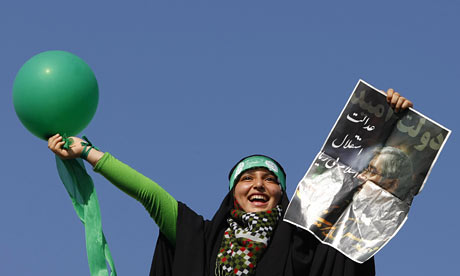A Lucky Survivor of Iran's Dungeons
For almost four months, interrogators tried to break Maziar Bahari. But with the help of a high-profile campaign and a Leonard Cohen song, he has lived to tell his tale, writes Robert Sibley.
By Robert Sibley, The Ottawa Citizen
March 3, 2010
 Canadian journalist Maziar Bahari, who was imprisoned by the Iranian
Canadian journalist Maziar Bahari, who was imprisoned by the Iranian
authorities for nearly four months in Tehran's Evin Prison, will be the
keynote speaker at a May 3 ceremony in Ottawa hosted by the
Canadian Committee for World Press Freedom.
Canadian journalist Maziar Bahari, who was imprisoned by the Iranian authorities for nearly four months in Tehran's Evin Prison, will be the keynote speaker at a May 3 ceremony in Ottawa hosted by the Canadian Committee for World Press Freedom.
Photograph by: Tom Stoddart, Getty Images, The Ottawa Citizen
There were times when Maziar Bahari thought of suicide. He talked to people who weren't there. He remembered song lyrics to keep himself sane.
And so it went until, finally, on Oct. 17, 2009, after 118 days, 12 hours and 54 minutes of imprisonment and harsh interrogation -- and a high-profile campaign on his behalf -- Iran's tyrannical theocrats let the Iranian-Canadian journalist go.
Tuesday, the Canadian Committee for World Press Freedom announced that Bahari, a reporter for Newsweek, will be the keynote speaker at its 12th annual Press Freedom Awards ceremony in Ottawa on May 3. Bahari, the committee said, "will describe the state of press freedom under the Ayatollahs from his personal experience."
Bahari was arrested on June 21 and taken to Tehran's notorious Evin prison where he was accused of being a spy. He had been reporting on the anti-government demonstrations that followed the country's presidential election, which was contested amid allegations of fraud. Since being released, Bahari has given several interviews to various media outlets, including CBC and CTV, about his ordeal.
During his four-month imprisonment, Bahari was kicked and beaten -- all without leaving visible physical marks. "They wanted me to be intact for televised, forced confessions," he told CTV.
The psychological pressure was, in some ways, worse. At one point Bahari thought of breaking a lens out of his glasses to cut his wrists. "I thought maybe it's better to just finish myself before they can do anything," he said in a CBC interview. "And I would just say, don't be stupid. Don't do their job for them. If they want to kill you they can do it themselves, but don't co-operate."
To keep himself from psychic collapse, he drew on dreams and held imaginary conversations with friends and colleagues. He found that, even when his interrogator beat him, he could hide in his head.
"I knew I had to create this parallel space for myself, a parallel universe that he could not penetrate," he told CBC. During one beating "I was thinking about Cape Town (in South Africa) and the ocean and, you know, being on the beach."
One night, he told CBC, he dreamed of two women who reminded him of his late sister. "'Who are you,'" he asked. " 'We are sisters of mercy,' and all of a sudden I heard Leonard Cohen's song, Sisters of Mercy, and, when I woke up, I felt much better about myself."
Bahari readily acknowledges the irony. "All of a sudden this universe was created, this universe that was guarded by Leonard Cohen and it was just ridiculous to me that this old, Jewish, and one of the most cynical poet-songwriters in the world managed to save me in the heart of the Islamic republic."
So it seems. Bahari was released shortly before his wife, lawyer Paola Gourley, gave birth to their daughter, Marianna. He was lucky. Without those who campaigned on his behalf, including the Canadian government, he might still be in prison like some 50 other journalists in Iran and elsewhere, or be one of the approximately 70 journalists killed around the world in 2009.
© Copyright (c) The Ottawa Citizen

